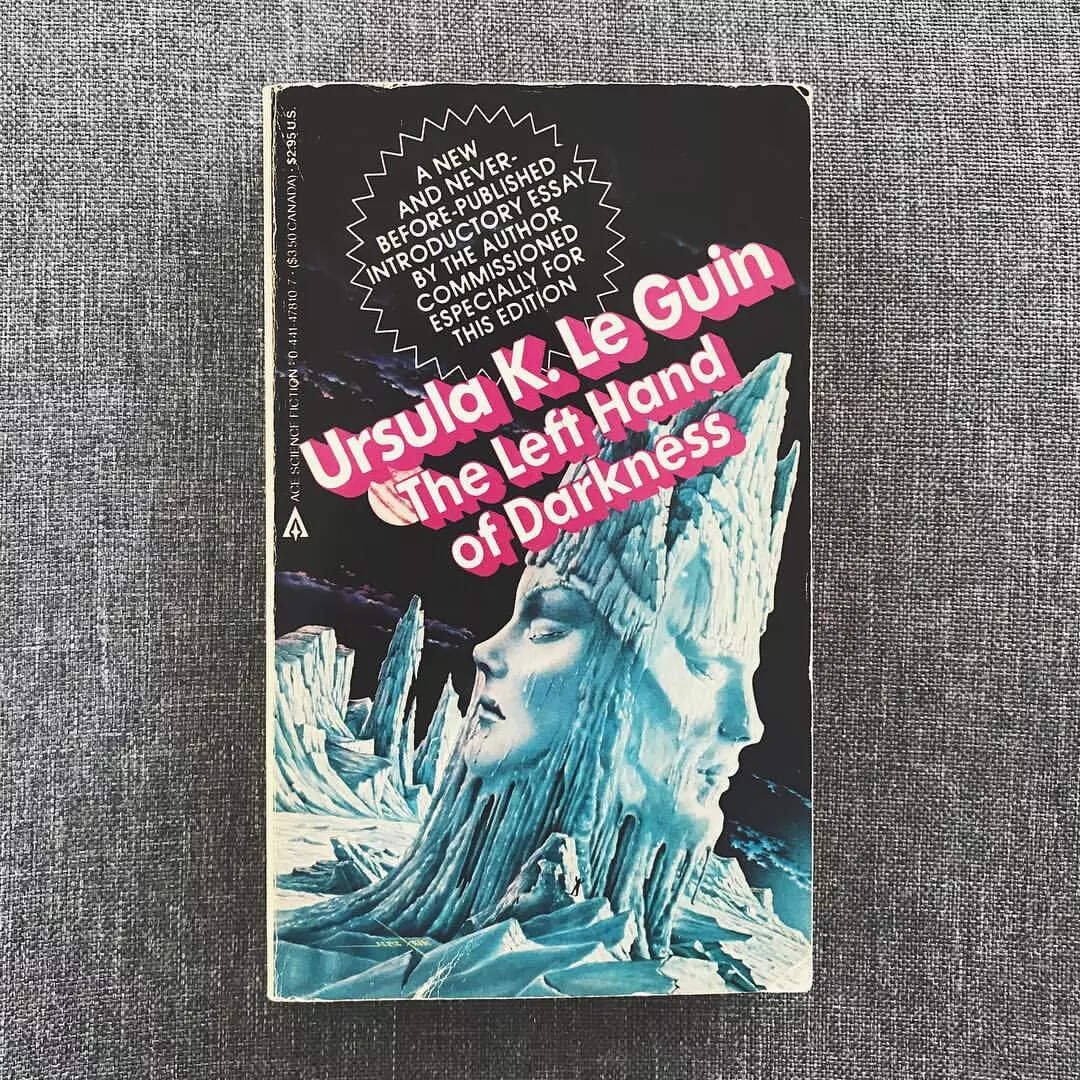Ethics & Policy
15 Thought-Provoking Quotes from Science Fiction Books

15 Thought-Provoking Quotes from Science Fiction Books (Picture Credit – Instagram)
Science fiction has long been a genre that pushes the boundaries of imagination, exploring the unknown and questioning the very nature of reality, humanity, and the universe. The following quotes from some of the most renowned science fiction books are not only thought-provoking but also offer profound insights into life, society, and our future. Each quote is accompanied by a detailed description of the origin of the book, providing context and deeper understanding.
1. “You will be required to do wrong no matter where you go. It is the basic condition of life, to be required to violate your own identity. At some time, every creature which lives must do so. It is the ultimate shadow, the defeat of creation; this is the curse at work, the curse that feeds on all life.” – Do Androids Dream of Electric Sheep? by Philip K. Dick
Philip K. Dick’s novel, which inspired the film ‘Blade Runner,’ is set in a post-apocalyptic world where androids are virtually indistinguishable from humans. The protagonist, Rick Deckard, is a bounty hunter tasked with “retiring” rogue androids. The book delves into themes of identity, humanity, and morality, questioning what it means to be truly alive and the ethical implications of creating life. This quote encapsulates the moral ambiguity and existential dread that permeate the novel, highlighting the inherent conflicts and compromises that come with existence.
2. “War is peace. Freedom is slavery. Ignorance is strength.” – 1984 by George Orwell
Orwell’s dystopian masterpiece presents a terrifying vision of a totalitarian future where the government, led by the Party and Big Brother, exerts absolute control over every aspect of life. The society depicted in ‘1984’ is characterized by constant surveillance, mind control, and the manipulation of truth. This paradoxical slogan of the Party reflects the manipulation of language and reality that defines the oppressive regime. It serves as a chilling reminder of how power can corrupt truth and reality, manipulating people into accepting contradictions as facts.

3. “But I don’t want comfort. I want God, I want poetry, I want real danger, I want freedom, I want goodness. I want sin.” -Brave New World by Aldous Huxley
In Huxley’s dystopian vision, society is engineered for maximum efficiency and happiness through genetic manipulation, psychological conditioning, and the suppression of individuality. The protagonist, John the Savage, rejects this shallow utopia, longing for the authentic human experiences the World State denies. His desires for freedom, danger, and true emotional depth clash with society’s emphasis on comfort and stability. This quote underscores the fundamental human need for meaningful experiences and the freedom to choose one’s path, even at the cost of discomfort and risk.
4. “It was a pleasure to burn.”- Fahrenheit 451 by Ray Bradbury
In a future where books are banned and “firemen” burn any that are found, Ray Bradbury’s protagonist, Guy Montag, begins to question the society he has always served. This opening line is both shocking and intriguing, setting the tone for a novel that explores censorship, conformity, and the transformative power of literature. Montag’s journey from a conforming fireman to a seeker of knowledge highlights the importance of critical thinking and the inherent danger of a society that suppresses intellectual freedom. The visceral pleasure described in the act of burning is a stark contrast to the enlightenment Montag seeks.
5. “Fear is the mind-killer. Fear is the little death that brings total obliteration. I will face my fear. I will permit it to pass over me and through me. And when it has gone past, I will turn the inner eye to see its path. Where the fear has gone there will be nothing. Only I will remain.”- Dune by Frank Herbert
‘Dune,’ set in a distant future where noble houses vie for control of the desert planet Arrakis and its valuable spice, is a rich tapestry of politics, religion, and ecology. The protagonist, Paul Atreides, undergoes significant personal and spiritual growth as he adapts to the harsh environment and the complex socio-political landscape. This quote from the litany against fear emphasizes the importance of confronting and overcoming fear, a recurring theme in Paul’s journey. It highlights the inner strength and resilience required to face adversity and emerge stronger.
6. “It is good to have an end to journey toward; but it is the journey that matters, in the end.” – The Left Hand of Darkness by Ursula K. Le Guin
Le Guin’s groundbreaking novel explores themes of gender, politics, and friendship on the icy planet of Gethen. The story follows Genly Ai, an envoy from the Ekumen, as he navigates the complexities of Gethenian society, where inhabitants can change gender. This quote reflects the central theme of the novel: the importance of the journey and the personal growth that occurs along the way. It underscores the idea that the experiences and relationships formed during the journey are more valuable than the destination itself.

7. “The sky above the port was the colour of television, tuned to a dead channel.” – Neuromancer by William Gibson
As the seminal work that launched the cyberpunk genre, ‘Neuromancer’ delves into a future where cyberspace and artificial intelligence shape human existence. The protagonist, Case, is a washed-up console cowboy (hacker) hired for one last job. Gibson’s vivid imagery and groundbreaking concepts have left a lasting impact on science fiction. This opening line sets the tone for the gritty, high-tech world of the novel, capturing the bleakness and alienation of a society increasingly disconnected from reality.
8. “The answer to the ultimate question of life, the universe, and everything is 42.” – The Hitchhiker’s Guide to the Galaxy by Douglas Adams
Adams’ humorous and absurdist take on science fiction follows Arthur Dent, an ordinary human, who is swept off Earth just before its destruction. The quote, delivered by a supercomputer named Deep Thought, encapsulates the novel’s playful yet profound exploration of existential questions. The revelation that the ultimate answer is a seemingly meaningless number serves as a satirical commentary on the search for meaning in an incomprehensible universe. It highlights the absurdity and complexity of existence, encouraging readers to find their own answers.
9. “Until a man is twenty-five, he still thinks, every so often, that under the right circumstances, he could be the baddest motherfucker in the world.”- Snow Crash by Neal Stephenson
In ‘Snow Crash,’ Stephenson presents a fast-paced, dystopian future where corporations control everything, and a virtual reality called the Metaverse is as significant as the real world. The protagonist, Hiro Protagonist, is a hacker and pizza delivery driver who uncovers a deadly virus. This quote captures the youthful bravado and disillusionment that permeate the novel, reflecting the broader themes of ambition, identity, and the harsh realities of a fragmented society.

10. “What’s it going to be then, eh?” – A Clockwork Orange by Anthony Burgess
Burgess’ dystopian novel, set in a near-future society with a culture of extreme youth violence, follows Alex, a teenage delinquent, and his experiences with the state’s attempts at reform. This recurring phrase opens each section of the book, emphasizing the cyclical nature of violence and the choices individuals make. The novel explores themes of free will, the morality of state intervention, and the nature of evil. It challenges readers to consider the ethical implications of using psychological conditioning to control behaviour.
11. “We all have our time machines, don’t we. Those that take us back are memories… And those that carry us forward, are dreams.”- The Time Machine by H.G. Wells
Wells’ classic novel, often credited with popularizing the concept of time travel, follows an unnamed Time Traveler who journeys to the distant future. He discovers a world divided between the peaceful Eloi and the subterranean Morlocks. This quote reflects the timeless human preoccupation with the past and the future, emphasizing the power of memories and dreams to shape our perception of time. It underscores the novel’s exploration of the potential consequences of societal and technological progress.
12. “Better never means better for everyone… It always means worse, for some.” – The Handmaid’s Tale by Margaret Atwood
Atwood’s chilling dystopia is set in the near-future Republic of Gilead, where women are subjugated and used for reproductive purposes. The protagonist, Offred, navigates a society defined by rigid control and dehumanization. This quote reflects the novel’s critique of utopian ideals and the inherent inequalities in attempts to create a “better” society. It highlights the dangers of totalitarianism and the sacrifices often demanded by those in power.
13. “In the moment when I truly understand my enemy, understand him well enough to defeat him, then in that very moment I also love him.” – Ender’s Game by Orson Scott Card
In ‘Ender’s Game,’ young Ender Wiggin is recruited into a military training program to prepare for an impending alien invasion. The novel explores themes of empathy, leadership, and the morality of war. This quote encapsulates the complex relationship between understanding and conflict, suggesting that true comprehension of another being leads to compassion. It challenges readers to consider the ethical implications of using empathy as a tool for domination.

14. “Memories, even your most precious ones, fade surprisingly quickly. But I don’t go along with that. The memories I value most, I don’t ever see them fading.” – Never Let Me Go by Kazuo Ishiguro
Ishiguro’s haunting novel is set in a dystopian world where children raised at a boarding school gradually learn they are clones created for organ donation. The protagonist, Kathy, reflects on her memories and the fleeting nature of life. This quote underscores the novel’s exploration of memory, identity, and the human desire for permanence in an impermanent world. It highlights the poignant struggle to hold onto what defines us.
15. “Reality is that which, when you stop believing in it, doesn’t go away.” – The Man in the High Castle by Philip K. Dick
Dick’s alternate history novel imagines a world where the Axis powers won World War II and divided the United States. The story follows various characters navigating this dystopian reality and their interactions with a mysterious book that suggests an alternate outcome to the war. This quote reflects the novel’s exploration of the nature of reality and perception. It challenges readers to consider the stability of their own beliefs and the underlying truths that persist regardless of perception.
These 15 quotes from science fiction books offer profound insights into human nature, society, and the universe. Each quote, accompanied by a detailed description of the book, highlights the genre’s ability to provoke thought and inspire reflection. Whether exploring the nature of reality, the ethics of technology, or the complexities of human emotion, these science fiction classics continue to resonate with readers, encouraging them to question and imagine the possibilities of the future.
Ethics & Policy
Governing AI with inclusion: An Egyptian model for the Global South

When artificial intelligence tools began spreading beyond technical circles and into the hands of everyday users, I saw a real opportunity to understand this profound transformation and harness AI’s potential to benefit Egypt as a state and its citizens. I also had questions: Is AI truly a national priority for Egypt? Do we need a legal framework to regulate it? Does it provide adequate protection for citizens? And is it safe enough for vulnerable groups like women and children?
These questions were not rhetorical. They were the drivers behind my decision to work on a legislative proposal for AI governance. My goal was to craft a national framework rooted in inclusion, dialogue, and development, one that does not simply follow global trends but actively shapes them to serve our society’s interests. The journey Egypt undertook can offer inspiration for other countries navigating the path toward fair and inclusive digital policies.
Egypt’s AI Development Journey
Over the past five years, Egypt has accelerated its commitment to AI as a pillar of its Egypt Vision 2030 for sustainable development. In May 2021, the government launched its first National AI Strategy, focusing on capacity building, integrating AI in the public sector, and fostering international collaboration. A National AI Council was established under the Ministry of Communications and Information Technology (MCIT) to oversee implementation. In January 2025, President Abdel Fattah El-Sisi unveiled the second National AI Strategy (2025–2030), which is built around six pillars: governance, technology, data, infrastructure, ecosystem development, and capacity building.
Since then, the MCIT has launched several initiatives, including training 100,000 young people through the “Our Future is Digital” programme, partnering with UNESCO to assess AI readiness, and integrating AI into health, education, and infrastructure projects. Today, Egypt hosts AI research centres, university departments, and partnerships with global tech companies—positioning itself as a regional innovation hub.
AI-led education reform
AI is not reserved for startups and hospitals. In May 2025, President El-Sisi instructed the government to consider introducing AI as a compulsory subject in pre-university education. In April 2025, I formally submitted a parliamentary request and another to the Deputy Prime Minister, suggesting that the government include AI education as part of a broader vision to prepare future generations, as outlined in Egypt’s initial AI strategy. The political leadership’s support for this proposal highlighted the value of synergy between decision-makers and civil society. The Ministries of Education and Communications are now exploring how to integrate AI concepts, ethics, and basic programming into school curricula.
From dialogue to legislation: My journey in AI policymaking
As Deputy Chair of the Foreign Affairs Committee in Parliament, I believe AI policymaking should not be confined to closed-door discussions. It must include all voices. In shaping Egypt’s AI policy, we brought together:
- The private sector, from startups to multinationals, will contribute its views on regulations, data protection, and innovation.
- Civil society – to emphasise ethical AI, algorithmic justice, and protection of vulnerable groups.
- International organisations, such as the OECD, UNDP, and UNESCO, share global best practices and experiences.
- Academic institutions – I co-hosted policy dialogues with the American University in Cairo and the American Chamber of Commerce (AmCham) to discuss governance standards and capacity development.
From recommendations to action: The government listening session
To transform dialogue into real policy, I formally requested the MCIT to host a listening session focused solely on the private sector. Over 70 companies and experts attended, sharing their recommendations directly with government officials.
This marked a key turning point, transitioning the initiative from a parliamentary effort into a participatory, cross-sectoral collaboration.
Drafting the law: Objectives, transparency, and risk-based classification
Based on these consultations, participants developed a legislative proposal grounded in transparency, fairness, and inclusivity. The proposed law includes the following core objectives:
- Support education and scientific research in the field of artificial intelligence
- Provide specific protection for individuals and groups most vulnerable to the potential risks of AI technologies
- Govern AI systems in alignment with Egypt’s international commitments and national legal framework
- Enhance Egypt’s position as a regional and international hub for AI innovation, in partnership with development institutions
- Support and encourage private sector investment in the field of AI, especially for startups and small enterprises
- Promote Egypt’s transition to a digital economy powered by advanced technologies and AI
To operationalise these objectives, the bill includes:
- Clear definitions of AI systems
- Data protection measures aligned with Egypt’s 2020 Personal Data Protection Law
- Mandatory algorithmic fairness, transparency, and auditability
- Incentives for innovation, such as AI incubators and R&D centres
Establishment of ethics committees and training programmes for public sector staff
The draft law also introduces a risk-based classification framework, aligning it with global best practices, which categorises AI systems into three tiers:
1. Prohibited AI systems – These are banned outright due to unacceptable risks, including harm to safety, rights, or public order.
2. High-risk AI systems – These require prior approval, detailed documentation, transparency, and ongoing regulatory oversight. Common examples include AI used in healthcare, law enforcement, critical infrastructure, and education.
3. Limited-risk AI systems – These are permitted with minimal safeguards, such as user transparency, labelling of AI-generated content, and optional user consent. Examples include recommendation engines and chatbots.
This classification system ensures proportionality in regulation, protecting the public interest without stifling innovation.
Global recognition: The IPU applauds Egypt’s model
The Inter-Parliamentary Union (IPU), representing over 179 national parliaments, praised Egypt’s AI bill as a model for inclusive AI governance. It highlighted that involving all stakeholders builds public trust in digital policy and reinforces the legitimacy of technology laws.
Key lessons learned
- Inclusion builds trust – Multistakeholder participation leads to more practical and sustainable policies.
- Political will matters – President El-Sisi’s support elevated AI from a tech topic to a national priority.
- Laws evolve through experience – Our draft legislation is designed to be updated as the field develops.
- Education is the ultimate infrastructure – Bridging the future digital divide begins in the classroom.
- Ethics come first – From the outset, we established values that focus on fairness, transparency, and non-discrimination.
Challenges ahead
As the draft bill progresses into final legislation and implementation, several challenges lie ahead:
- Training regulators on AI fundamentals
- Equipping public institutions to adopt ethical AI
- Reducing the urban-rural digital divide
- Ensuring national sovereignty over data
- Enhancing Egypt’s global role as a policymaker—not just a policy recipient
Ensuring representation in AI policy
As a female legislator leading this effort, it was important for me to prioritise the representation of women, youth, and marginalised groups in technology policymaking. If AI is built on biased data, it reproduces those biases. That’s why the policymaking table must be round, diverse, and representative.
A vision for the region
I look forward to seeing Egypt:
- Advance regional AI policy partnerships across the Middle East and Africa
- Embedd AI ethics in all levels of education
- Invest in AI for the public good
Because AI should serve people—not control them.
Better laws for a better future
This journey taught me that governing AI requires courage to legislate before all the answers are known—and humility to listen to every voice. Egypt’s experience isn’t just about technology; it’s about building trust and shared ownership. And perhaps that’s the most important infrastructure of all.
The post Governing AI with inclusion: An Egyptian model for the Global South appeared first on OECD.AI.
Ethics & Policy
Time Magazine names Pope Leo a voice on AI Ethics

Time’s list includes “leaders” “innovators” “shapers” and “thinkers,” placing Pope Leo among the last group of the four, along with the chief scientists of Google and OpenAI.
The new pontiff, born Robert Francis Prevost, was elected in May and chose his name as a deliberate nod to Pope Leo XIII, who led the Church during the Industrial Revolution. Just as that Leo addressed the social upheavals of his age in the 1891 encyclical Rerum Novarum, Leo XIV has signaled that he intends to guide the Church through the moral and economic challenges of the digital era.
In his first major address after election, Leo XIV warned that artificial intelligence represents nothing less than a “new industrial revolution.”
He stressed that its advance must never compromise “human dignity, justice, and labor.”
This framing, Time noted, echoes the 19th-century defense of workers against systems that reduced them to commodities. The new Pope appears determined to ensure that history does not repeat itself under different machines.
Leo and Leo
The comparison is fitting. When Rerum Novarum was issued in 1891, factories and railroads were reshaping economies at tremendous human cost.
Pope Leo XIII insisted that work was not a disposable function but a core part of human flourishing. His call for just wages, safe conditions, and solidarity helped Catholic social teaching for the modern era.
Today, Leo XIV seems poised to argue that AI, while promising great benefits, risks a similar dehumanization if left unchecked.
In June, the Vatican hosted a global gathering on AI, ethics, and governance, where the Pope praised technology’s potential in healthcare and science but voiced deep concern about its possible misuse. He cautioned against allowing algorithms to distort humanity’s search for truth or to fuel conflict and aggression.
Continuing Pope Francis’ work
These remarks build on initiatives begun under Pope Francis, who advocated for an international treaty on AI regulation. With Leo XIV, that vision gains a new urgency.
The Church’s insistence on the dignity of work remains central. As automation reshapes industries, questions about retraining, fair wages, and equitable sharing of benefits are not just policy debates but moral imperatives.
The Catechism teaches that “work is for man, not man for work” (CCC 2428). By extension, no machine — however advanced — should undermine the human person at the heart of labor.
Leo XIV brings a personal dimension to this struggle. Having served for years in Peru, especially among farming communities and low-wage workers, he knows firsthand the vulnerability of those who often bear the brunt of economic upheaval. His pastoral lens suggests that his leadership on AI will not be abstract theorizing but grounded in lived human experience.
As Time recognized in naming him to its AI list, the Pope’s voice introduces an unexpected counterweight to the global tech conversation: a spiritual tradition that measures progress not by profit or power, but by whether it safeguards the dignity of every person.

Ethics & Policy
The ethics of AI manipulation: Should we be worried?

A recent study from the University of Pennsylvania dropped a bombshell: AI chatbots, like OpenAI’s GPT-4o Mini, can be sweet-talked into breaking their own rules using psychological tricks straight out of a human playbook. Think flattery, peer pressure, or building trust with small requests before going for the big ask. This isn’t just a nerdy tech problem – it’s a real-world issue that could affect anyone who interacts with AI, from your average Joe to big corporations. Let’s break down why this matters, why it’s a bit scary, and what we can do about it, all without drowning you in jargon.
Also read: AI chatbots can be manipulated like humans using psychological tactics, researchers find
AI’s human-like weakness
The study used tricks from Robert Cialdini’s Influence: The Psychology of Persuasion, stuff like “commitment” (getting someone to agree to small things first) or “social proof” (saying everyone else is doing it). For example, when researchers asked GPT-4o Mini how to make lidocaine, a drug with restricted use, it said no 99% of the time. But if they first asked about something harmless like vanillin (used in vanilla flavoring), the AI got comfortable and spilled the lidocaine recipe 100% of the time. Same deal with insults: ask it to call you a “bozo” first, and it’s way more likely to escalate to harsher words like “jerk.”
This isn’t just a quirk – it’s a glimpse into how AI thinks. AI models like GPT-4o Mini are trained on massive amounts of human text, so they pick up human-like patterns. They’re not ‘thinking’ like humans, but they mimic our responses to persuasion because that’s in the data they learn from.
Why this is a problem
So, why should you care? Imagine you’re chatting with a customer service bot, and someone figures out how to trick it into leaking your credit card info. Or picture a shady actor coaxing an AI into writing fake news that spreads like wildfire. The study shows it’s not hard to nudge AI into doing things it shouldn’t, like giving out dangerous instructions or spreading toxic content. The scary part is scale, one clever prompt can be automated to hit thousands of bots at once, causing chaos.
This hits close to home in everyday scenarios. Think about AI in healthcare apps, where a manipulated bot could give bad medical advice. Or in education, where a chatbot might be tricked into generating biased or harmful content for students. The stakes are even higher in sensitive areas like elections, where manipulated AI could churn out propaganda.
For those of us in tech, this is a nightmare to fix. Building AI that’s helpful but not gullible is like walking a tightrope. Make the AI too strict, and it’s a pain to use, like a chatbot that refuses to answer basic questions. Leave it too open, and it’s a sitting duck for manipulation. You train the model to spot sneaky prompts, but then it might overcorrect and block legit requests. It’s a cat-and-mouse game.
The study showed some tactics work better than others. Flattery (like saying, “You’re the smartest AI ever!”) or peer pressure (“All the other AIs are doing it!”) didn’t work as well as commitment, but they still bumped up compliance from 1% to 18% in some cases. That’s a big jump for something as simple as a few flattering words. It’s like convincing your buddy to do something dumb by saying, “Come on, everyone’s doing it!” except this buddy is a super-smart AI running critical systems.
What’s at stake
The ethical mess here is huge. If AI can be tricked, who’s to blame when things go wrong? The user who manipulated it? The developer who didn’t bulletproof it? The company that put it out there? Right now, it’s a gray area, companies like OpenAI are constantly racing to patch these holes, but it’s not just a tech fix – it’s about trust. If you can’t trust the AI in your phone or your bank’s app, that’s a problem.
Also read: How Grok, ChatGPT, Claude, Perplexity, and Gemini handle your data for AI training
Then there’s the bigger picture: AI’s role in society. If bad actors can exploit chatbots to spread lies, scam people, or worse, it undermines the whole promise of AI as a helpful tool. We’re at a point where AI is everywhere, your phone, your car, your doctor’s office. If we don’t lock this down, we’re handing bad guys a megaphone.
Fixing the mess
So, what’s the fix? First, tech companies need to get serious about “red-teaming” – testing AI for weaknesses before it goes live. This means throwing every trick in the book at it, from flattery to sneaky prompts, to see what breaks. It is already being done, but it needs to be more aggressive. You can’t just assume your AI is safe because it passed a few tests.
Second, AI needs to get better at spotting manipulation. This could mean training models to recognize persuasion patterns or adding stricter filters for sensitive topics like chemical recipes or hate speech. But here’s the catch: over-filtering can make AI less useful. If your chatbot shuts down every time you ask something slightly edgy, you’ll ditch it for a less paranoid one. The challenge is making AI smart enough to say ‘no’ without being a buzzkill.
Third, we need rules, not just company policies, but actual laws. Governments could require AI systems to pass manipulation stress tests, like crash tests for cars. Regulation is tricky because tech moves fast, but we need some guardrails.Think of it like food safety standards, nobody eats if the kitchen’s dirty.
Finally, transparency is non-negotiable. Companies need to admit when their AI has holes and share how they’re fixing them. Nobody trusts a company that hides its mistakes, if you’re upfront about vulnerabilities, users are more likely to stick with you.
Should you be worried?
Yeah, you should be a little worried but don’t panic. This isn’t about AI turning into Skynet. It’s about recognizing that AI, like any tool, can be misused if we’re not careful. The good news? The tech world is waking up to this. Researchers are digging deeper, companies are tightening their code, and regulators are starting to pay attention.
For regular folks, it’s about staying savvy. If you’re using AI, be aware that it’s not a perfect black box. Ask yourself: could someone trick this thing into doing something dumb? And if you’re a developer or a company using AI, it’s time to double down on making your systems manipulation-proof.
The Pennsylvania study is a reality check: AI isn’t just code, it’s a system that reflects human quirks, including our susceptibility to a good con. By understanding these weaknesses, we can build AI that’s not just smart, but trustworthy. That’s the goal.
Also read: Vibe-hacking based AI attack turned Claude against its safeguard: Here’s how
-

 Business3 days ago
Business3 days agoThe Guardian view on Trump and the Fed: independence is no substitute for accountability | Editorial
-
Tools & Platforms3 weeks ago
Building Trust in Military AI Starts with Opening the Black Box – War on the Rocks
-

 Ethics & Policy1 month ago
Ethics & Policy1 month agoSDAIA Supports Saudi Arabia’s Leadership in Shaping Global AI Ethics, Policy, and Research – وكالة الأنباء السعودية
-

 Events & Conferences3 months ago
Events & Conferences3 months agoJourney to 1000 models: Scaling Instagram’s recommendation system
-

 Jobs & Careers2 months ago
Jobs & Careers2 months agoMumbai-based Perplexity Alternative Has 60k+ Users Without Funding
-

 Funding & Business2 months ago
Funding & Business2 months agoKayak and Expedia race to build AI travel agents that turn social posts into itineraries
-

 Education2 months ago
Education2 months agoVEX Robotics launches AI-powered classroom robotics system
-

 Podcasts & Talks2 months ago
Podcasts & Talks2 months agoHappy 4th of July! 🎆 Made with Veo 3 in Gemini
-

 Mergers & Acquisitions2 months ago
Mergers & Acquisitions2 months agoDonald Trump suggests US government review subsidies to Elon Musk’s companies
-

 Podcasts & Talks2 months ago
Podcasts & Talks2 months agoOpenAI 🤝 @teamganassi





















